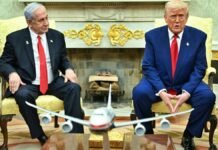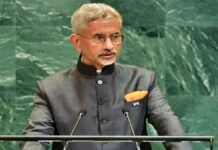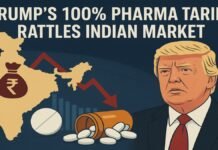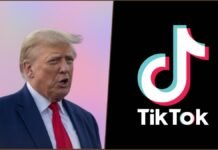
Key Points
- President Donald Trump has announced a 100% tariff on all movies produced outside the US, citing national security and the decline of the American film industry.
- The Department of Commerce and US Trade Representative have been instructed to begin immediate implementation, though details remain unclear.
- Trump also ordered the reopening and expansion of Alcatraz prison to house America’s “most ruthless and violent offenders.”
- Both moves have triggered sharp criticism from the film industry and political opponents, raising concerns about economic impact and feasibility.
- Hollywood has lost significant business to foreign countries offering lucrative incentives, with LA film production down nearly 40% in the past decade.
Mumbai: In a pair of dramatic policy moves, US President Donald Trump on Sunday announced a 100% tariff on movies produced outside the United States and ordered the reopening and expansion of the historic Alcatraz prison. The decisions, aimed at reviving the American film industry and reinforcing a tough-on-crime stance, have ignited debate across the entertainment sector and political spectrum.
100% Tariff on Foreign Films: A Bid to Revive Hollywood
Trump’s announcement, delivered via his Truth Social platform, declared that all non-US films entering the American market will face a 100% tariff. The president argued that foreign governments are luring US filmmakers abroad with generous tax incentives and cash rebates, contributing to a “rapid decline” in domestic film production. He labeled the situation a “national security threat,” asserting that foreign-made films serve as “messaging and propaganda”.
“The American movie industry is dying a very fast death. This is a concerted effort by other Nations and, therefore, a National Security threat. We want movies made in America again!” Trump posted.
Commerce Secretary Howard Lutnick confirmed on social media that the administration is moving quickly to enforce the tariffs. However, neither Trump nor his officials have specified how the tariffs will be implemented-whether they will target all foreign films, American productions shot overseas, or only those benefiting from foreign incentives.
The move comes as Hollywood faces mounting challenges: LA film and TV production has dropped nearly 40% over the last decade, and global content spending is projected to reach $248 billion this year. Major studios such as Disney, Paramount, and Warner Bros. often shoot abroad to cut costs, raising questions about the tariff’s impact on the industry’s recovery from the pandemic and ongoing trade tensions with China.
Industry and Political Backlash
The announcement has drawn sharp criticism from filmmakers, industry groups, and trade experts. Many warn that the tariffs could backfire, increasing costs for studios and limiting consumer choice, while potentially sparking retaliatory measures from trading partners. The Motion Picture Association, representing major studios, declined to comment, but recent reports highlight that the US film sector still maintains a trade surplus in global markets.
Trump’s plan also follows his earlier appointment of Hollywood icons Jon Voight, Mel Gibson, and Sylvester Stallone as special ambassadors to help revive the industry, signaling a broader push to restore Hollywood’s global dominance.
Alcatraz Prison to Reopen for ‘Most Ruthless’ Offenders
In a separate announcement, Trump directed the Bureau of Prisons, Department of Justice, FBI, and Homeland Security to reopen and expand Alcatraz, the infamous island prison off San Francisco closed since 1963. Trump said the facility would house America’s “most ruthless and violent offenders,” describing the move as a symbol of “law, order, and justice.”
“For too long, America has been plagued by vicious, violent, and repeat criminal offenders… When we were a more serious Nation, we did not hesitate to lock up the most dangerous criminals, and keep them far away from anyone they could harm. That’s the way it’s supposed to be,” Trump stated.
The plan comes amid Trump’s ongoing legal battles over deporting gang members and his controversial proposals to send US criminals to overseas prisons. Critics, including California officials, have questioned the feasibility and cost of reopening Alcatraz, which currently serves as a national park and tourist attraction.
What’s Next?
Both the 100% film tariff and the Alcatraz reopening are expected to face legal, logistical, and political hurdles. The administration has not detailed how the film tariffs will be enforced or how Alcatraz will be modernized to meet current correctional standards. Meanwhile, industry leaders and lawmakers are bracing for potential economic fallout and international pushback.
As Hollywood and the criminal justice system await further details, Trump’s latest moves underscore his administration’s willingness to take bold, controversial steps on trade and law enforcement-setting the stage for heated debate in the months ahead.







































